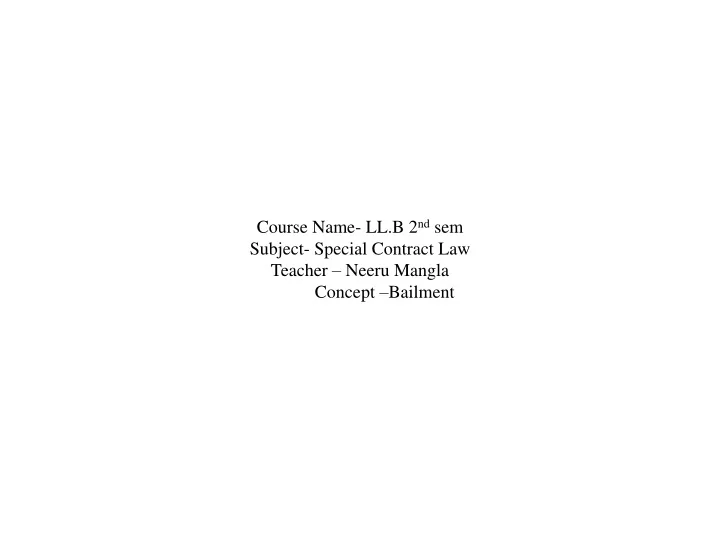

Course Name- LL.B 2 nd sem Subject- Special Contract Law Teacher – Neeru Mangla Concept – Bailment
Bailment • Bailment as defined in section 148 of the Indian contract act 1872 is the delivery of goods by one person to another for some specific purpose, upon a contract that these goods are to be returned when the specific purpose is complete. For example, A delivering his car for Service at the service center is an example of bailment. The person delivering the goods is known as bailor and the person to whom goods are delivered is known as bailee. However, if the owner continues to maintain control over the goods, there is no bailment
Essential elements of bailment Delivery of possession of goods : Delivery of goods from one person to another person for some purpose is an essential elements of bailment. According to Section 149 of the Indian Contract Act, 1872 the delivery to the bailee may be made by doing anything which has the effect of putting the goods in the possession of the intended bailee or of any person authorised to hold them on his behalf .
Delivery of possession upon a contract : There can be no bailment without a contract. all conditions for valid contract are to be satisfied, such as Competent parties, free consent lawful object etc. Return or dispose of goods according to the direction : In bailment the goods are delivered for specific purpose. after the purpose is accomplished the goods may be returned to the bailor in the same or altered direction, condition or maybe disposed of as directed by bailor. If the person to whom the goods are delivered is not bound to restore them to the person delivering them or to deal with them according to the mandate their relationship will not be that of bailor and bailee. The good must be returned. No transfer of ownership. Consideration is not necessary: The contract of bailment may be gratuitous or non- gratuitous. If bailment is made for the benefit of a bailor or of a bailee, it is gratuitous. For example, X lets his bike to A just for 10 minutes.
Rights and Duties of Bailor Bailor is a party or person, one who agrees to deliver his goods to the bailee for some purpose for some period of time on a condition that the bailee shall ultimately return the goods to the bailor. For example, if A delivers his car to B for a week, here A is bailor and the car may be delivered gratuitously or non-gratuitously. The rights of a bailor are given below: Enforcement of a bailee’s duties: Bailor can enforce the duties of bailee 1. as his own right by suit in the following circumstances: (i) to demand compensation, in case of damage of goods. (ii) to demand damage in case of an unauthorized use of goods or breach of the terms, and unauthorized mixing of goods with other goods. (iii) to return goods in the prescribed time. (iv) to demand natural increment or profit in goods.
Right to avoid or terminate the contract The bailor has a right to terminate the contract at any time in the following circumstances: (i) if the objectives of the contract cannot be fulfilled. (ii) if the contract has an illegal object. (iii) if the bailee breaches the terms of contract. (iv) if the bailment is gratuitous. Restoration of goods lent gratuitous .
Duties of Bailor Duty to disclose the known defects of good: A bailor has to disclose the known defects of the goods for bailment. If the bailor does not do so, he will be responsible for the harm or the loss to bailee, but not for unknown defects. Duty to bear extraordinary expenses: The bailor is responsible to bear the extraordinary expenses of goods, e.g., medical treatment of sick animals, or the expenses made for keeping the good safe. Duty to indemnify the bailee : The bailor is responsible to the bailee for any loss due to his/her imperfect or defective title of the goods and premature termination of the contract. Duty to receive back the goods.
Rights and Duties of Bailee The right of bailee is given below: 1. Right to be indemnified for the loss caused by lack of information about the goods, defective titles of good. 2. Right to deliver goods to one of the several (joint owners): If the bailment contract is concluded by several joint owner, the bailee may deliver the goods back to one of the joint owners, without consent of other owner in the absence of any agreement to the contrary. 3. Right of special lien: Special right is the right of a bailee that can keep the goods bailed in his/her custody until the bailor does not pay all the necessary charges. The bailee even can recover the charge by selling the property. 4. Right to deliver the goods to bailor even though the real owner of goods is not the bailor.
Duties of Bailee The duties of Bailee is given below: 1. Duty not to make unauthorized use of the good bailed. 2. Not to mix the bailed goods with other goods. 3. Duty to take reasonable care of the goods bailed. 4. Duty to return the goods to the bailor in time. 5. To return the goods with their natural profit or increments. 6. To follow the terms and the instruction of the bailor. 7. Duty to compensate the loss or damage caused by him/her.
Recommend
More recommend